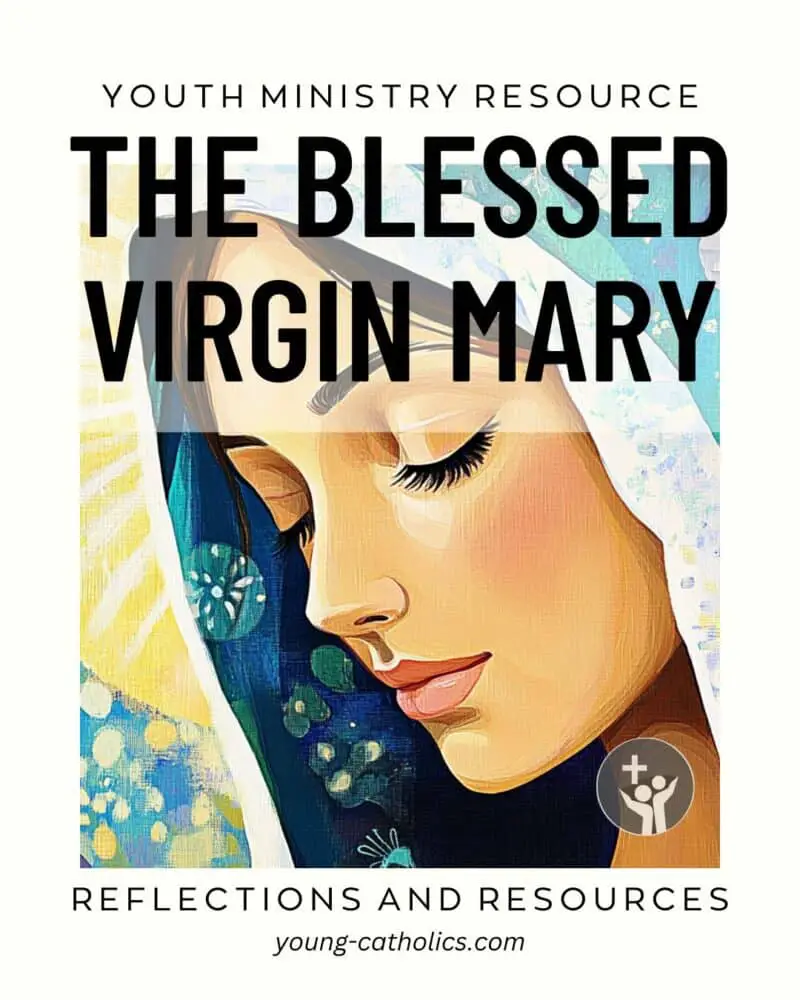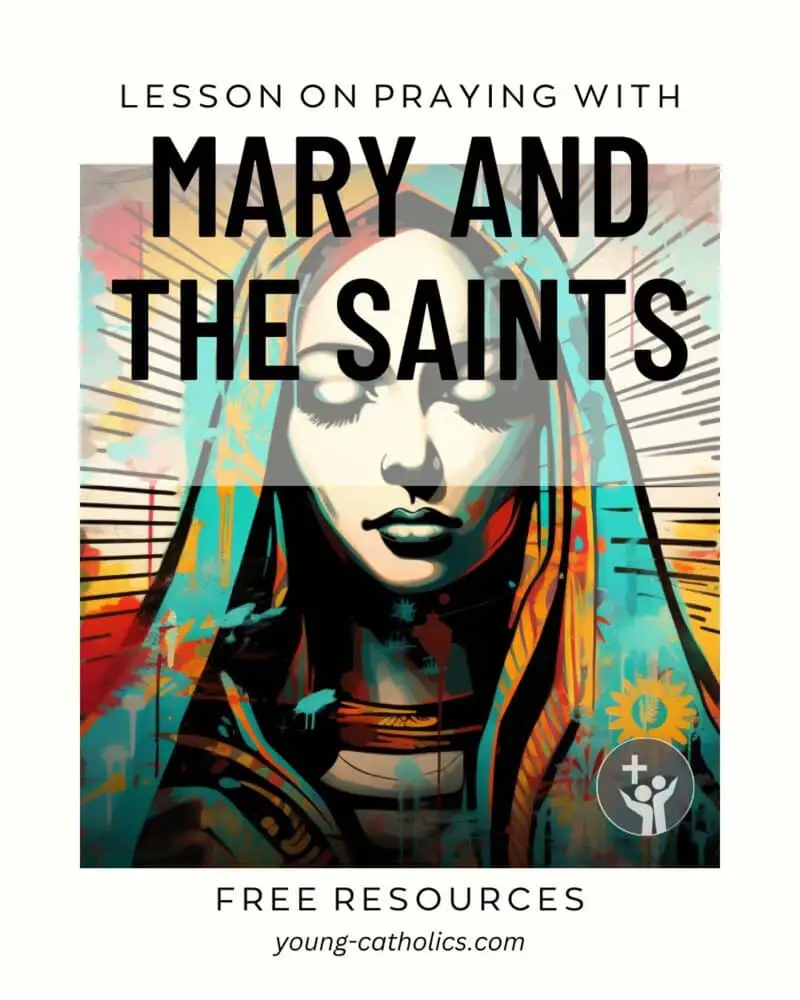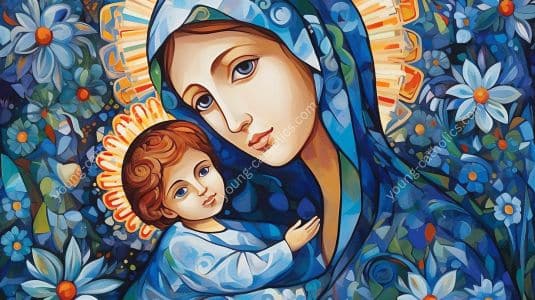The Blessed Virgin Mary
Mother of Jesus and Model of Faith

The Blessed Virgin Mary holds a very special place in the Catholic Church. She is the mother of Jesus Christ, the Savior, and plays a unique role in God’s plan for salvation. Catholics honor her as the Mother of God because Jesus, who is fully God and fully human, came into the world through her. This title, “Mother of God,” reflects Mary’s great importance in our faith.
Mary’s role is essential to understanding the story of Jesus and the Church. By saying “yes” to God at the Annunciation, she opened her heart to God’s plan. Through her obedience, she allowed God’s love to enter the world in a powerful way. Her willingness to trust God, even without knowing what her future would bring, makes her an example of faith and courage.
As the Blessed Virgin Mary journeyed with Jesus, she showed the strength of a true disciple. She trusted God completely and lived a humble life dedicated to His will. She did not seek attention or power but instead quietly fulfilled her role as the mother of the Savior. Her example teaches us that true greatness comes from faith, humility, and love.
Mary serves as a model for all believers, showing us how to follow Jesus faithfully. Her life shows us the importance of listening to God’s call and responding with trust. Catholics look to the Blessed Virgin Mary as a guide, a mother, and an intercessor. Through her, we learn how to love and serve God with our whole hearts.
Mother of God (Theotokos)
In the Catholic Church, the Blessed Virgin Mary is given the title “Mother of God,” which honors her unique role as the mother of Jesus Christ. In Greek, this title is expressed as “Theotokos,” meaning “God-bearer.” By calling Mary the Mother of God, we recognize that she carried and gave birth to Jesus, who is both fully human and fully divine. This title emphasizes that Jesus, as one person with two natures—divine and human—came into the world through Mary.
Mary’s role as Mother of God is deeply significant in Catholic teaching. This title reminds us of the mystery of the Incarnation: that God chose to become human through Mary. She did not just give birth to a human child; she gave birth to God in human form. As the Mother of Jesus, she holds a unique and honored place in salvation history, bringing God’s presence into the world in a profound way. Through her, Jesus entered our world to bring redemption.
The moment when Mary received this calling from God is known as the Annunciation. When the Angel Gabriel appeared to Mary, he announced that she would become the mother of the Savior through the power of the Holy Spirit. Gabriel told her, “The Holy Spirit will come upon you, and the power of the Most High will overshadow you. Therefore the child to be born will be called holy, the Son of God” (Luke 1:35). Mary’s response—her “yes” to God—shows her trust and willingness to accept this unique role, even though she could not know all that it would involve.
The Catechism of the Catholic Church also affirms the Blessed Virgin Mary’s role as Mother of God. It teaches that “Mary, in whom the Lord himself has just made his dwelling, is the daughter of Zion in person, the Ark of the Covenant, the place where the glory of the Lord dwells” (CCC 2676).
As the Ark of the New Covenant, Mary carried Jesus, the Word made flesh, in her womb. This makes her a vital part of God’s plan, not only as the mother of Jesus but also as a symbol of God’s presence with His people. The Blessed Virgin Mary, through her role as Mother of God, stands as a model of faith and trust, reminding us of God’s love and presence among us.
Mother of the Church
The Blessed Virgin Mary is honored in the Catholic Church not only as the Mother of Jesus but also as the Mother of all believers. This special role is seen in the Gospel of John when Jesus, hanging on the cross, entrusts His mother to His disciple, John. Jesus says to Mary, “Woman, behold, your son,” and to John, “Behold, your mother” (John 19:26-27). Catholics believe that, in this moment, Jesus was giving Mary to all His followers as a spiritual mother.
Through these words, Mary became a mother to all of us, offering her guidance and care. As the Mother of the Church, she looks out for all who follow Jesus, loving them as her own children. Just as she cared for Jesus and supported Him during His life, Catholics believe that Mary now cares for and supports the Church. This title, “Mother of the Church,” emphasizes her ongoing role as a source of help and protection for Christians.
The Blessed Virgin Mary continues to guide the Church through her prayers and example. Catholics believe that she intercedes, or prays, for all of us, asking God to bless and strengthen us in our faith. Just as we may ask a friend to pray for us, we can ask Mary, our spiritual mother, to pray on our behalf. Her prayers are powerful because of her close relationship with Jesus, and Catholics trust in her support as we walk our own paths of faith.
The Catechism of the Catholic Church describes Mary’s role as “wholly united with her Son” and calls her the “Mother of the Church” (CCC 963). This teaching shows that Mary is not only a model for us but also a loving presence who intercedes for us. As the Blessed Virgin Mary guides and prays for us, she leads us closer to Jesus. Through her role as the Mother of the Church, she reminds us that we are not alone on our faith journey and that we have her support along the way.
The New Eve
The Blessed Virgin Mary is often called the “New Eve” in Catholic tradition. This title points to the deep connection between Mary and Eve, the first woman in the Bible. Just as Eve was part of the story of creation and the fall, Mary is part of God’s plan for redemption. Where Eve’s choices led to sin entering the world, Mary’s choices helped bring salvation through Jesus Christ.
The title “New Eve” is rooted in Genesis 3:15, known as the protoevangelium, or “first gospel.” In this verse, God speaks to the serpent after Adam and Eve’s sin, saying, “I will put enmity between you and the woman, and between your offspring and hers; they will strike at your head, while you strike at their heel.” Many Catholics believe this “woman” refers to Mary, whose offspring, Jesus, would ultimately defeat evil. In this way, Mary becomes part of God’s plan to undo the damage caused by sin.
Early Church Fathers, like St. Irenaeus, saw the Blessed Virgin Mary’s “yes” to God as reversing Eve’s “no.” While Eve disobeyed God, Mary obeyed Him completely when she agreed to become the mother of Jesus. St. Irenaeus famously wrote, “The knot of Eve’s disobedience was loosed by the obedience of Mary.” This means that where Eve’s actions led to the fall, Mary’s obedience opened the door to salvation through Jesus. The Blessed Virgin Mary, by her faithfulness, becomes a symbol of hope and redemption.
In the Catholic Church, the Blessed Virgin Mary is seen as a model of humility and faith, qualities that contrast sharply with Eve’s doubt and disobedience. While Eve’s actions led to suffering, Mary’s willingness to follow God’s will helped to bring life and salvation. By calling Mary the New Eve, Catholics recognize her unique role in God’s plan and honor her as a mother to all believers, bringing grace where there was once sin. Through her example, Mary shows us the power of saying “yes” to God.
The Immaculate Conception
The Immaculate Conception is a special teaching about the Blessed Virgin Mary in the Catholic Church. It means that from the moment she was conceived, Mary was preserved from original sin. This was not something Mary did on her own; it was a unique grace given by God. Through this grace, God kept her free from sin so she could fulfill her role as the Mother of Jesus.
This teaching of the Immaculate Conception points to Mary’s special role in God’s plan of salvation. God gave her this grace in view of Jesus’ future sacrifice on the cross. In other words, Mary was saved by Jesus, but in a unique way. Instead of being saved from sin after she was born, she was preserved from it entirely, right from her beginning. This shows how God prepared Mary to be a pure and holy vessel for Jesus.
The Immaculate Conception also connects to Mary’s role as the New Eve. While Eve was created without sin, she chose to disobey God. Mary, on the other hand, was also created free from sin, but she chose to obey God completely. Through her obedience, Mary played a part in undoing the damage caused by Eve’s disobedience. In this way, the Blessed Virgin Mary became a new beginning, allowing God’s grace to enter the world through her Son, Jesus.
As the Mother of God, it was fitting that the Blessed Virgin Mary be preserved from sin. Her purity and holiness made her a suitable mother for Jesus, who is Himself pure and holy. The Immaculate Conception honors Mary’s special role in salvation history and reminds us of her unique relationship with God. Through this teaching, Catholics recognize the Blessed Virgin Mary as a model of holiness and as the one chosen by God to bring His Son into the world.
Her Titles and Their Meanings
The Blessed Virgin Mary is honored with many different titles in the Catholic Church. Each title reflects her role in the lives of believers or highlights a special event where she appeared or provided comfort. These titles remind us of Mary’s ongoing presence in the Church and her care for all of God’s people. Some titles are based on apparitions or devotions, while others emphasize aspects of Mary’s life and relationship with Jesus. Here are a few:
Our Lady of Guadalupe is one of the most beloved titles of the Blessed Virgin Mary. She appeared to a Native American man named Juan Diego in 1531 in what is now Mexico. Her miraculous image appeared on his cloak, and this event brought many people in the region to faith. Our Lady of Guadalupe is especially loved in Latin America and is known as the Patroness of the Americas.
Our Lady of Fatima comes from Mary’s appearance to three shepherd children in Fatima, Portugal, in 1917. During these apparitions, she asked the children to pray the Rosary and to dedicate themselves to peace and conversion. Her message of prayer and repentance had a powerful impact worldwide, and her feast day is celebrated on May 13.
Our Lady of Lourdes appeared to a young girl named Bernadette in Lourdes, France, in 1858. In one of these visions, Mary identified herself as the Immaculate Conception, confirming the Church’s teaching about her own sinlessness. The waters at Lourdes have become a place of healing, where many pilgrims visit each year seeking spiritual and physical health.
Our Lady of Sorrows is a title that honors the many sorrows the Blessed Virgin Mary experienced throughout her life. This includes the suffering she endured as she witnessed Jesus’ crucifixion and death. This devotion helps Catholics remember Mary’s deep love and sacrifice as she shared in her Son’s suffering. Her feast day is September 15, the day after the feast of the Holy Cross.
Our Lady of the Rosary, also known as Our Lady of Victory, is honored for her role in a historic naval victory that protected Europe from invasion in the 16th century. Catholics were encouraged to pray the Rosary, and many believe that Mary’s intercession led to the victory. Her feast day on October 7 celebrates the power of prayer and Mary’s protection.
Our Lady of Mount Carmel is the title of the Blessed Virgin Mary as the patroness of the Carmelite Order. This devotion dates back to early Christian hermits who lived on Mount Carmel in the Holy Land. Mary is said to watch over her children, and the scapular of Our Lady of Mount Carmel is worn by many Catholics as a sign of her protection.
Our Lady Undoer of Knots is a title with roots in a devotion that asks the Blessed Virgin Mary to help untangle the “knots” or challenges in our lives. This title is especially popular among Catholics who are struggling with difficult problems. Pope Francis has encouraged this devotion, as it reminds us that Mary intercedes for us in our daily struggles.
Each of these titles reflects a different aspect of the Blessed Virgin Mary’s role in the Church. Through these devotions, Catholics connect to Mary’s presence in history and experience her loving intercession in their lives. Her many titles show her closeness to people around the world and remind us of her love and care for all God’s children.
Understanding Marian Devotion

Honoring, Not Worshiping the Blessed Virgin Mary
In the Catholic Church, the Blessed Virgin Mary is deeply honored, but she is not worshiped. Catholics venerate Mary, which means they show her great respect and love, but worship is given to God alone. Sometimes, this devotion to Mary can be misunderstood as worship. However, Catholics see her as a guide and mother in faith, someone who leads us closer to God, not as a deity.
Veneration of Mary comes from her special role in salvation history. God chose Mary to be the mother of Jesus, giving her a unique and holy place in His plan for humanity. Catholics honor her for saying “yes” to God, which allowed Jesus to come into the world. By honoring Mary, we recognize her faith, courage, and humility, which set an example for all believers. Mary is a model of holiness, showing us how to follow God’s will with love and trust.
An important part of Marian devotion is asking for her intercession. When Catholics pray to Mary, they are asking her to pray for them, much like asking a friend to pray on their behalf. This does not mean Catholics believe Mary has the power to grant wishes or perform miracles on her own. Rather, they believe she brings their prayers to God. The Blessed Virgin Mary, being close to her Son, is seen as a compassionate intercessor who prays for us and helps guide us on our spiritual journey.
The Catholic practice of Marian devotion is rooted in love and respect, not worship. Catholics look to Mary as a mother who cares for her children, offering support and guidance. By asking for her prayers, Catholics believe they are drawing closer to Jesus, who loves His mother. In honoring the Blessed Virgin Mary, Catholics are reminded of her role in salvation history and her example of living a life fully devoted to God.
See Why Do Catholics Pray to Mary and the Saints? A Lesson Plan.
Marian Devotions
Connecting with the Blessed Virgin Mary
Catholics have many devotions that honor the Blessed Virgin Mary and help them grow in faith. These practices allow believers to connect with Mary’s life and her relationship with God. One of the most well-known Marian devotions is the Rosary. The Rosary is a series of prayers, including the Hail Mary and the Our Father, while meditating on important moments from Jesus and Mary’s lives, called “mysteries.” Through the Rosary, Catholics reflect on events like the Annunciation, the Crucifixion, and the Resurrection, drawing closer to Jesus through Mary’s eyes.
Another important devotion is the Seven Sorrows of Mary, which focuses on moments of suffering in Mary’s life. The Seven Sorrows recall events like the flight into Egypt, when Mary and Joseph had to flee with baby Jesus, and the sorrow she felt at the Crucifixion. This devotion helps Catholics understand Mary’s deep love and sacrifice. By meditating on her sorrows, Catholics find strength and comfort in their own suffering, seeing Mary as a compassionate mother who understands pain and grief.
The Immaculate Heart of Mary is another devotion that highlights Mary’s love for God and for all people. This devotion focuses on Mary’s heart as a symbol of her pure and devoted love for God. By honoring the Immaculate Heart of Mary, Catholics are encouraged to love God more deeply and to reflect on the importance of purity, humility, and dedication in their own lives. The feast of the Immaculate Heart is a time for Catholics to renew their commitment to God, following Mary’s example of faithful love.
These Marian devotions help Catholics grow closer to Jesus by deepening their connection with the Blessed Virgin Mary. Mary’s life reflects God’s love and grace, and her example guides Catholics in following Jesus more fully. When Catholics pray the Rosary, meditate on her sorrows, or honor her Immaculate Heart, they open their hearts to Mary’s love and example, which always points them toward Jesus. Through these devotions, Catholics find a spiritual companion in Mary, who walks with them on their journey of faith.
A Model of Discipleship and Humility

The Blessed Virgin Mary is a powerful example of discipleship and humility for all Christians. Her journey of faith begins with her response to God at the Annunciation, when the Angel Gabriel tells her she will be the mother of Jesus. Mary responds with her “fiat,” which means “let it be.” She says, “Let it be done to me according to your word.” In this moment, Mary accepts God’s plan for her life with complete trust and openness. Her “yes” to God is a model for all believers, showing the courage it takes to follow God’s will.
Mary’s humility and faith shine throughout her life. She did not seek attention or fame; she simply wanted to serve God. Even though she was chosen for an extraordinary role, she lived with quiet strength and dedication. She faced challenges, such as traveling to Bethlehem while pregnant and fleeing to Egypt to protect Jesus. In every situation, Mary remained faithful and trusted in God’s guidance. Her humble acceptance of God’s plan teaches us that true greatness comes from obedience and trust, not from seeking our own glory.
The Blessed Virgin Mary’s example influenced the early Church and continues to inspire Christians today. After Jesus’ death and resurrection, Mary stayed with the disciples, praying with them and supporting them. She was present at Pentecost, when the Holy Spirit came upon the apostles, giving them the courage to spread the Gospel. As the mother of Jesus, she was respected and loved by the early Christians, who saw her as a source of guidance and comfort. Her role in the early Church shows her commitment to the mission of Christ and her dedication to the Christian community.
Through her life, the Blessed Virgin Mary shows us the qualities of a true disciple: humility, faith, and strength. Her example encourages us to trust in God’s plan, even when we do not fully understand it. By following her example, we can learn to live with humility and serve others as she did. Mary’s life of discipleship reminds us that God calls each of us to follow Him in our own way, and that, like Mary, we are never alone in our journey.
Social Media Graphics and Bulletin Artwork
If you would like an image to be made available as a specific product (card, poster, mug, etc.) or as an extra high resolution image for personal use just post a comment about what you want and we will create a link to our online store for you.
Gentle Light of Mary

This beautiful poster captures Mary in quiet prayer, her eyes closed in peace and trust. Surrounded by bright colors and floral patterns, she shines as a reminder of faith, love, and hope. Perfect for any Christian home, church, or prayer space, this image invites reflection and comfort.
Click on the image for more information on how to get the full sized artwork.
Paid subscribers may download a large copy this digital artwork without watermarks, suitable for use in bulletins, social media, newsletters, etc., free of charge by clicking here. You must be logged in as a paid subscriber to access the file.
Only current paid subscribers have the rights to use the artwork.
Madonna of the Blossoms

Bring home the warmth of Madonna of the Blossoms. This heartfelt image of Mary and Jesus is available as a poster, canvas, card, home décor, and digital download. A beautiful gift for any Christian home or a comforting addition to your personal prayer space.
Click on the image for more information on how to get the full sized artwork.
Paid subscribers may download a large copy this digital artwork without watermarks, suitable for use in bulletins, social media, newsletters, etc., free of charge by clicking here. You must be logged in as a paid subscriber to access the file.
Only current paid subscribers have the rights to use the artwork.
Questions and Answers about the Blessed Virgin Mary
Why do Catholics call the Blessed Virgin Mary the “Mother of God”?
Catholics call Mary the “Mother of God” because she is the mother of Jesus, who is both fully human and fully God. By saying “yes” to God’s plan, Mary brought Jesus into the world, making her the mother of God in human form.
Do Catholics worship Mary?
No, Catholics do not worship the Blessed Virgin Mary. Worship is for God alone. Catholics honor Mary and ask for her prayers, just like asking a friend to pray for us. Mary is respected as the mother of Jesus and as a powerful example of faith.
What is the Immaculate Conception?
The Immaculate Conception means that Mary was preserved from original sin from the moment of her conception. This was a special grace given to her by God because she was chosen to be the mother of Jesus.
Why do Catholics pray the Rosary?
Catholics pray the Rosary to reflect on the lives of Jesus and Mary. The Rosary includes prayers and meditation on important events in their lives, called mysteries. This devotion helps Catholics grow closer to God through Mary’s example.
What does it mean that the Blessed Virgin Mary is the “New Eve”?
Mary is called the “New Eve” because, through her obedience, she helped undo the harm caused by Eve’s disobedience in the Garden of Eden. Just as Eve’s actions led to sin, Mary’s “yes” to God led to salvation through Jesus.
Why is Mary called the Mother of the Church?
Mary is called the Mother of the Church because, on the cross, Jesus entrusted her to all believers. Catholics see her as a loving spiritual mother who guides and prays for the Church.
What is the difference between veneration and worship?
Veneration means showing deep respect and honor, while worship is reserved for God alone. Catholics venerate the Blessed Virgin Mary for her special role and holiness, but worship belongs only to God.
What are some popular Marian devotions?
Some popular Marian devotions include the Rosary, the Seven Sorrows of Mary, and the Immaculate Heart of Mary. These devotions help Catholics connect with Mary’s life and faith, and grow closer to Jesus through her.
Why do Catholics ask the Blessed Virgin Mary to intercede for them?
Catholics believe Mary is close to God and can bring our prayers to Him. Asking Mary to intercede is like asking a friend to pray for us. Catholics believe her prayers can help guide and strengthen them.
Why is the Blessed Virgin Mary important to Catholics?
Mary is important to Catholics because of her role as the mother of Jesus and as a model of faith and humility. Her life shows how to trust in God, and her example inspires believers to live with love, strength, and obedience to God’s will.
Mother, Model, and Guide
The Blessed Virgin Mary holds a unique place in the Catholic faith as the mother of Jesus and as a guiding example of faith and humility. Known by many titles, including Mother of God and Mother of the Church, Mary is deeply respected for her role in God’s plan of salvation. By accepting God’s will with her “yes” at the Annunciation, she brought Jesus into the world and made God’s love present in a powerful way. Her life and actions show us how to trust God even when the path is uncertain.
Mary is also seen as a caring mother to all believers. On the cross, Jesus gave her to His disciples, symbolizing her new role as the spiritual mother of the Church. Catholics believe Mary continues to care for us by praying for us and guiding us on our journey of faith. We honor her through devotions like the Rosary, where we remember key events in her life and in the life of Jesus. These devotions bring us closer to her and, through her, closer to God.
Many Catholics ask for Mary’s intercession, believing her prayers bring them comfort and strength. This practice is not worship but a way of seeking Mary’s support, just as we might ask a friend to pray for us. As the New Eve, Mary’s obedience to God helps undo the harm caused by sin, making her a model of discipleship for all. Her life inspires us to live with humility, courage, and faith, following her example in our own relationship with God.
Your Turn
Take a moment to reflect on what the Blessed Virgin Mary means to you. How has her example of faith, courage, and love inspired your own journey?
Share your experiences and thoughts in the comments section, and let’s learn from each other’s insights about Mary’s role in our lives. Whether it’s a favorite prayer or a special devotion, we’d love to hear how Mary has touched your heart.

Leave a Reply